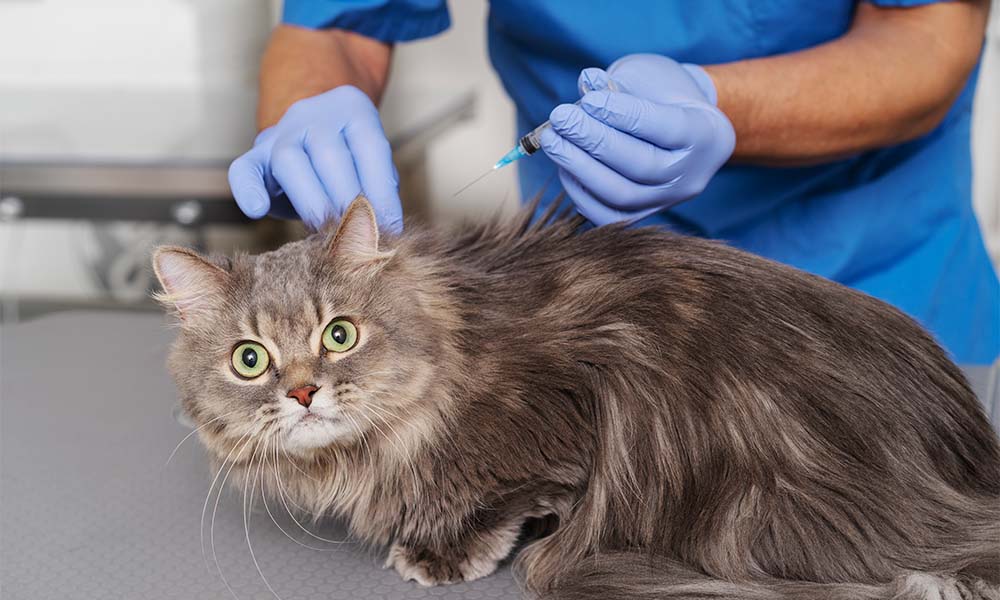Boarding your cat can be stressful—both for you and your feline companion. One major concern is whether your cat is fully protected from infectious diseases during their stay. If your cat isn’t up to date with vaccinations, they could be at risk in a communal environment. But how do you ensure their safety?
It all starts with an essential preventative measure: the F3 vaccination for cats. So, what exactly is the F3 vaccine, and why is it necessary before boarding?
What is the F3 Vaccination for Cats?
The F3 vaccine is a combination of three core vaccines designed to protect your cat against common yet dangerous feline diseases.
Here’s a quick breakdown:
- Feline Herpesvirus (FHV-1): Causes respiratory infections with symptoms like sneezing, coughing, runny nose, and eye discharge.
- Feline Calicivirus (FCV): Another respiratory virus that leads to mouth ulcers, lameness, and fever.
- Feline Panleukopenia (FPV): Commonly known as feline distemper, it attacks the immune system, causing vomiting, diarrhoea, and even death in severe cases.
Why is F3 Vaccination a Must for Boarding Cats?
Cats in a boarding facility are in close quarters with other animals, increasing the risk of spreading infections.
Here’s why F3 vaccination for cats is crucial before boarding:
1. Prevent Highly Contagious Diseases
The diseases targeted by F3 are highly contagious and can spread through direct contact, shared bowls, or even through the air. Without vaccination, your cat is vulnerable in environments like catteries, where various animals come and go.
2. Mitigate Serious Health Risks
Respiratory diseases and panleukopenia can lead to severe health complications, particularly for kittens or cats with weaker immune systems. The F3 vaccine is your cat’s shield against these threats.
3. Ensure a Safe Stay at Boarding Facilities
Most boarding facilities won’t accept cats that haven’t received the F3 vaccination, and for good reason. Vaccinated animals help maintain a healthy environment, reducing the chances of outbreaks.
How F3 Vaccination Protects Other Cats
Your cat isn’t the only one at risk. Unvaccinated cats can become carriers of disease, putting others at risk in a crowded facility. By vaccinating your cat, you help create a safer space for all felines.
- Lower Outbreak Risks: Vaccination cuts the chance of disease outbreaks in boarding facilities.
- Protect Other Cats: Your cat will not be a carrier of contagious viruses to other boarders.
- Maintain Facility Standards: Boarding centres enforce vaccination requirements to protect all pets.
Preparing Your Cat for Boarding: Steps to Take
Before your cat heads off for their boarding stay, make sure you’re fully prepared with these steps:
Check the Facility’s Vaccination Policy
Every facility has specific requirements for vaccinations. Confirm these details before booking your cat’s stay at The Cat Castle, where we ensure a non-territorial and social environment, meaning your cat can comfortably interact with others.
Schedule Vaccinations Early
Make sure your cat gets vaccinated well ahead of their boarding stay. Vaccines may take time to be fully effective.
Bring Vaccination Records
Keep your cat’s vaccination records handy. Most boarding facilities require proof of vaccination before admission.
Book a Vet Check-Up
A pre-boarding vet visit ensures that your cat is in good health, free from other issues that could complicate their stay.
Final Thoughts
Ensuring the F3 vaccination for cats is one of the best steps you can take to safeguard their health, particularly when boarding them.
With this simple precaution, you can rest easy knowing they are well-protected from infectious diseases. Your peace of mind is important, and so is your cat’s safety.
At The Cat Castle, we make sure that your cat’s stay is not just safe, but enjoyable. With no dogs around to disrupt the peace, your feline friend will have a home away from home experience.
So, don’t wait—make sure your cat’s F3 vaccinations are up to date before their next boarding stay.
Are you ready to board your cat at a reliable, safe facility? Make sure their F3 vaccinations are up to date! For more details on cat boarding and vaccination requirements, Contact Cat Castle today for a consultation, or book your spot at our secure cattery.
Frequently Asked Questions
The F3 vaccination schedule depends on your cat’s age and health. Kittens typically need an initial series of shots, followed by booster vaccinations every 1 to 3 years. Consult your vet to ensure your cat is up-to-date.
Some cats may experience mild side effects like lethargy, a temporary loss of appetite, or swelling at the injection site. These symptoms usually resolve on their own within a day or two.
Even indoor cats can be exposed to viruses. The F3 vaccine is recommended for all cats, regardless of lifestyle, as diseases can be brought into the home.
If your cat shows any signs of illness after their boarding stay, contact your vet immediately for a check-up.
Check with your veterinarian about booster shots. Cats may need regular boosters to maintain strong immunity.





